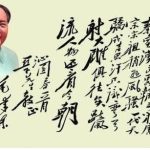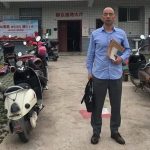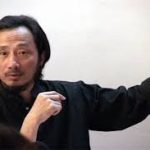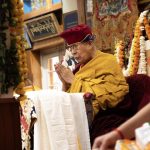BBC, 10 December 2010: The chairman of the Nobel prize committee has called for the immediate release of jailed Chinese dissident Liu Xiaobo, winner of the 2010 peace prize.
There were two standing ovations at the ceremony in Oslo for Mr Liu, who was represented only by an empty chair.
China has been angered by the award and has waged a campaign in recent weeks to discredit it.
Nobel chairman Thorbjorn Jagland praised China for lifting millions of people out of poverty.
He called it an “extraordinary achievement” but warned China that its new status as a leading world power meant Beijing “must regard criticism as positive”.
He said the Nobel committee was calling for Mr Liu to be freed immediately, saying: “He hasn’t done anything wrong.”
For its part, China’s foreign ministry condemned the ceremony as a “political farce”.
“We resolutely oppose any country or any person using the Nobel Peace Prize to interfere with China’s internal affairs or infringe upon China’s legal sovereignty,” said the ministry in a statement.
‘Quest for freedom’
During the award ceremony, Norwegian actress Liv Ullmann read out a statement that Mr Liu had made in court during his trial in December 2009.
Continue reading the main story Why China considers Liu Xiaobo a threat1989: leading activist in Tiananmen Square protests for democratisation; jailed for two years1996: spoke out against China’s one-party system; sent to labour camp for three years2008: co-author of Charter 08, calling for a new constitution, an independent judiciary and freedom of expression;2009: jailed for subversion for 11 years; verdict says he “had the goal of subverting our country’s people’s democratic dictatorship and socialist system. The effects were malign and he is a major criminal”.Reaction outside Nobel laureate’s home Excerpts: Liu Xiaobo’s final statementCharter 08: A call for changeLiu Xiaobo: the right choice?
“I, filled with optimism, look forward to the advent of a future, free China,” said the statement.
“For there is no force that can put an end to the human quest for freedom, and China will in the end become a nation ruled by law, where human rights reign supreme.”
Honouring the new laureate, Mr Jagland placed the Nobel diploma on the empty chair marking Mr Liu’s absence.
The Nobel chairman compared China’s anger at the award to the outcry over peace prizes awarded to other dissidents of their times, including South African archbishop Desmond Tutu and the Burmese pro-democracy leader Aung San Suu Kyi.
He said Mr Liu was dedicating his prize to “the lost souls from 4 June”, those who died in the pro-democracy protests on that date in Tiananmen Square in 1989.
“We can say (Mr) Liu reminds us of Nelson Mandela,” he said. The former South African president received the Nobel Peace Prize in 1993.
The UN says it had information that China detained at least 20 activists ahead of the ceremony.
An image of Liu Xiaobo is being thrown on to the facade of the Grand Hotel in the centre of Oslo as night falls, after the city honoured this year’s Nobel peace laureate.
For the first time in more than 70 years the peace prize ceremony has been essentially symbolic, with the recipient in jail and none of the close family members who would be entitled to receive the prize on his behalf allowed to leave China.
The most symbolic moment of all was when the chairman of the Norwegian Nobel committee, Thorbjorn Jagland, placed Liu Xiaobo’s medal on a chair on the podium that had been deliberately left empty.
It has been one of the most controversial peace prizes for years.
To China, the award has diminished this prestigious prize.
But to the Nobel committee, China’s diplomatic offensive over the award only justifies the choice of Liu Xiaobo as a deserving winner.
A further 120 cases of house arrest, travel restriction, forced relocation and other acts of intimidation have been reported.
The BBC’s English and Chinese language websites have been blocked, and BBC TV coverage was blacked out inside China during the ceremony.
Mr Liu, one of China’s leading dissidents, is serving an 11-year sentence in a jail in north-east China for state subversion.
Police are stationed outside his home in Beijing where his wife, Liu Xia, is under house arrest.
Chinese pressure
Geir Lundestad, the director of the Nobel committee, said 48 foreign delegations attended the Oslo ceremony, 16 countries – including Russia, Saudi Arabia and Pakistan – turned down the invitation and the Chinese returned their invitation unopened.
Analysts say many of those who stayed away did so as a result of Chinese pressure.
However, Serbia – which had previously said it would not attend – announced on Friday that it would be sending a representative.
The Serbian government, which has warm relations with China, had come under pressure from within the European Union and from political parties and civil society groups in Serbia to attend.
Beijing had sought to prevent anyone travelling from China to Oslo to collect the prize on Mr Liu’s behalf.
On the other hand, China said the committee had chosen a criminal convicted under Chinese law to serve the interests of certain Western countries, our correspondent says.
Pressure on dissidents
Liu Xiaobo first came to prominence when he took part in the 1989 protests in Beijing’s Tiananmen Square.
He was sent to prison for nearly two years for his role, and has been a critic of the Chinese government ever since.
He was given an 11-year prison sentence in December 2009 for inciting the subversion of state power, a charge which came after he co-authored a document known as Charter 08.
The document calls openly for political reforms in China, such as a separation of powers and legislative democracy.
This year marks the first time since 1936 that the Nobel Peace Prize, now worth $1.5m (£950,000), was not handed out.
The BBC’s Damian Grammaticas reports from the prison holding Liu Xiaobo
UN human rights chief Navi Pillay on Thursday again called for Mr Liu to be released “as soon as possible”.
Last year’s peace prize winner, US President Barack Obama, has also called for his release.
The Chinese government has been furious about the award ever since it was announced in October that Liu Xiaobo had won it.
Beijing says that Mr Liu is a criminal, and insists that giving him a prize is an insult to China’s judicial system.
As well as putting Liu Xia, the Nobel laureate’s wife, under house arrest, the authorities have put pressure on other activists and dissidents.
Some have been prevented from leaving the country, while others have been forced to leave their homes for the next few days, according to the Chinese Human Rights Defenders.
One of those to disappear, it said, was Zhang Zuhua, the man who co-wrote Charter 08.
China imposes blanket ban on Nobel ceremony
There were two standing ovations at the ceremony in Oslo for Mr Liu, who was represented only by an empty chair.
China has been angered by the award and has waged a campaign in recent weeks to discredit it.
Nobel chairman Thorbjorn Jagland praised China for lifting millions of people out of poverty.
He called it an “extraordinary achievement” but warned China that its new status as a leading world power meant Beijing “must regard criticism as positive”.
He said the Nobel committee was calling for Mr Liu to be freed immediately, saying: “He hasn’t done anything wrong.”
For its part, China’s foreign ministry condemned the ceremony as a “political farce”.
“We resolutely oppose any country or any person using the Nobel Peace Prize to interfere with China’s internal affairs or infringe upon China’s legal sovereignty,” said the ministry in a statement.
‘Quest for freedom’
During the award ceremony, Norwegian actress Liv Ullmann read out a statement that Mr Liu had made in court during his trial in December 2009.
Continue reading the main story Why China considers Liu Xiaobo a threat1989: leading activist in Tiananmen Square protests for democratisation; jailed for two years1996: spoke out against China’s one-party system; sent to labour camp for three years2008: co-author of Charter 08, calling for a new constitution, an independent judiciary and freedom of expression;2009: jailed for subversion for 11 years; verdict says he “had the goal of subverting our country’s people’s democratic dictatorship and socialist system. The effects were malign and he is a major criminal”.Reaction outside Nobel laureate’s home Excerpts: Liu Xiaobo’s final statementCharter 08: A call for changeLiu Xiaobo: the right choice?
“I, filled with optimism, look forward to the advent of a future, free China,” said the statement.
“For there is no force that can put an end to the human quest for freedom, and China will in the end become a nation ruled by law, where human rights reign supreme.”
Honouring the new laureate, Mr Jagland placed the Nobel diploma on the empty chair marking Mr Liu’s absence.
The Nobel chairman compared China’s anger at the award to the outcry over peace prizes awarded to other dissidents of their times, including South African archbishop Desmond Tutu and the Burmese pro-democracy leader Aung San Suu Kyi.
He said Mr Liu was dedicating his prize to “the lost souls from 4 June”, those who died in the pro-democracy protests on that date in Tiananmen Square in 1989.
“We can say (Mr) Liu reminds us of Nelson Mandela,” he said. The former South African president received the Nobel Peace Prize in 1993.
The UN says it had information that China detained at least 20 activists ahead of the ceremony.
An image of Liu Xiaobo is being thrown on to the facade of the Grand Hotel in the centre of Oslo as night falls, after the city honoured this year’s Nobel peace laureate.
For the first time in more than 70 years the peace prize ceremony has been essentially symbolic, with the recipient in jail and none of the close family members who would be entitled to receive the prize on his behalf allowed to leave China.
The most symbolic moment of all was when the chairman of the Norwegian Nobel committee, Thorbjorn Jagland, placed Liu Xiaobo’s medal on a chair on the podium that had been deliberately left empty.
It has been one of the most controversial peace prizes for years.
To China, the award has diminished this prestigious prize.
But to the Nobel committee, China’s diplomatic offensive over the award only justifies the choice of Liu Xiaobo as a deserving winner.
A further 120 cases of house arrest, travel restriction, forced relocation and other acts of intimidation have been reported.
The BBC’s English and Chinese language websites have been blocked, and BBC TV coverage was blacked out inside China during the ceremony.
Mr Liu, one of China’s leading dissidents, is serving an 11-year sentence in a jail in north-east China for state subversion.
Police are stationed outside his home in Beijing where his wife, Liu Xia, is under house arrest.
Chinese pressure
Geir Lundestad, the director of the Nobel committee, said 48 foreign delegations attended the Oslo ceremony, 16 countries – including Russia, Saudi Arabia and Pakistan – turned down the invitation and the Chinese returned their invitation unopened.
Analysts say many of those who stayed away did so as a result of Chinese pressure.
However, Serbia – which had previously said it would not attend – announced on Friday that it would be sending a representative.
The Serbian government, which has warm relations with China, had come under pressure from within the European Union and from political parties and civil society groups in Serbia to attend.
Beijing had sought to prevent anyone travelling from China to Oslo to collect the prize on Mr Liu’s behalf.
On the other hand, China said the committee had chosen a criminal convicted under Chinese law to serve the interests of certain Western countries, our correspondent says.
Pressure on dissidents
Liu Xiaobo first came to prominence when he took part in the 1989 protests in Beijing’s Tiananmen Square.
He was sent to prison for nearly two years for his role, and has been a critic of the Chinese government ever since.
He was given an 11-year prison sentence in December 2009 for inciting the subversion of state power, a charge which came after he co-authored a document known as Charter 08.
The document calls openly for political reforms in China, such as a separation of powers and legislative democracy.
This year marks the first time since 1936 that the Nobel Peace Prize, now worth $1.5m (£950,000), was not handed out.
The BBC’s Damian Grammaticas reports from the prison holding Liu Xiaobo
UN human rights chief Navi Pillay on Thursday again called for Mr Liu to be released “as soon as possible”.
Last year’s peace prize winner, US President Barack Obama, has also called for his release.
The Chinese government has been furious about the award ever since it was announced in October that Liu Xiaobo had won it.
Beijing says that Mr Liu is a criminal, and insists that giving him a prize is an insult to China’s judicial system.
As well as putting Liu Xia, the Nobel laureate’s wife, under house arrest, the authorities have put pressure on other activists and dissidents.
Some have been prevented from leaving the country, while others have been forced to leave their homes for the next few days, according to the Chinese Human Rights Defenders.
One of those to disappear, it said, was Zhang Zuhua, the man who co-wrote Charter 08.
China imposes blanket ban on Nobel ceremony













